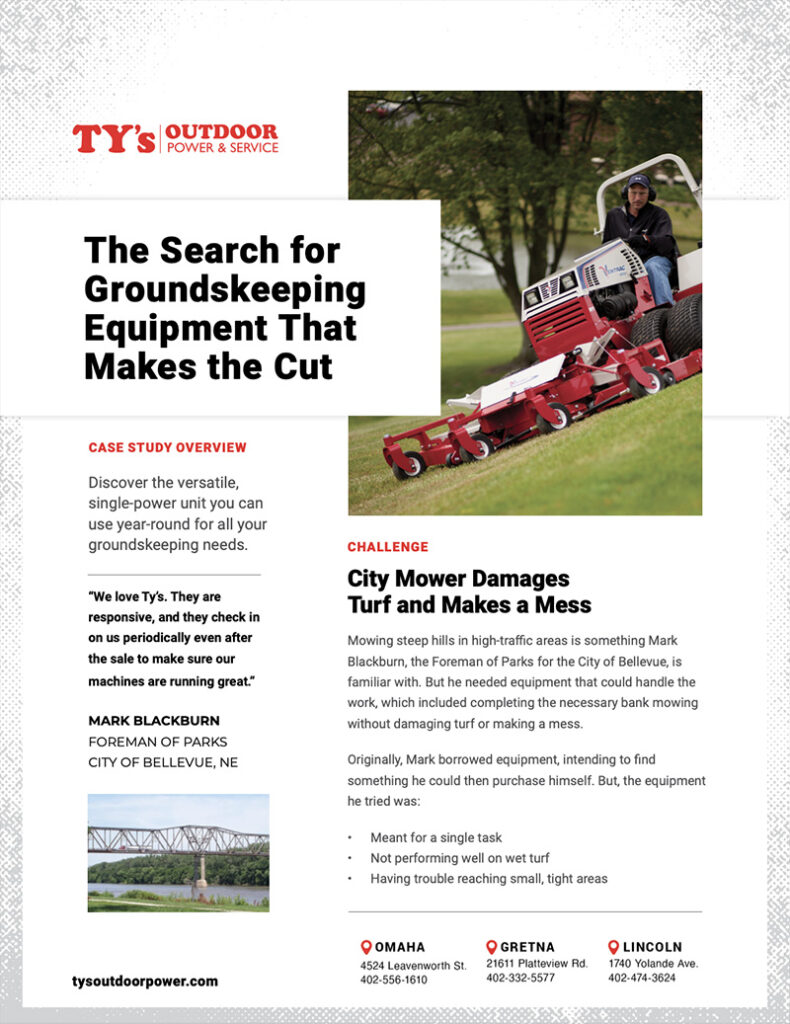Are you a homeowner in need of a new lawn mower? With so many options on the market, it can be overwhelming to choose the right one for your needs. But don’t worry, we’re here to help!
In this blog, we will break down key considerations to keep in mind before buying a new lawn mower.
Yard type considerations when purchasing a residential lawn mower
When selecting a lawnmower for your yard, it’s important to consider the specific needs of your landscape. Here are some yard-type considerations to keep in mind when choosing a residential lawn mower:
Small, flat yards
If you have a small, flat yard, a walk mower may be sufficient. These mowers are lightweight and easy to maneuver in tight spaces. Robotic mowers are also an option to get the job done with less work on your part.
Large, flat yards
For larger lawns, a self-propelled walk mower or riding mower can help you get the job done quickly and efficiently.
Hilly yards
If your yard has slopes or hills, look for a lawnmower with rear-wheel drive or all-wheel drive. This will provide better traction and stability on uneven terrain.
Yards with obstacles and/or lots of landscaping
Consider a mower with excellent maneuverability such as a zero-turn mower or a mower with variable-speed rear-wheel drive. These mowers make it easier to navigate around flower beds, trees, and other obstacles.
Yards with tall grass
If your yard tends to have taller grass, look for a mower with a powerful engine and a wide cutting deck. This will help you tackle the job more efficiently.
Remember to also consider additional features, such as comfort features and extra attachments that may enhance your mowing experience.
Engine power considerations when purchasing a residential lawn mower
Engine power determines the ability to efficiently cut through different types of grass and handle mulching operations. A lawn mower with adequate engine power ensures you can quickly and easily mow your lawn.
Gas-powered engines vs. electric lawn mowers
When it comes to selecting a lawnmower, one important consideration is the type of power. The two main options are gas-powered engines and electric motors. Each has its pros and cons, so it’s essential to understand how they compare to make an informed decision.
Gas-Powered Lawn Mower Engines:
Pros
- Powerful: Gas engines are known for their high-performance capabilities, making them suitable for cutting through thick and tall grass.
- No battery limitations: Gas-powered mowers can run as long as there is fuel in the tank, allowing extended mowing sessions.
- Suitable for larger lawns: If you have a large yard, a gas-powered mower may be the best option. They often have larger cutting decks and can cover more area efficiently.
Cons
- Noise and emissions: Gas engines tend to be louder and produce emissions. This may not be ideal for environmentally conscious homeowners or those in noise-sensitive areas.
- Maintenance: Gas engines require regular maintenance, including oil changes, spark plug replacements, and air filter cleaning or replacement.
Local Service: Ty’s Outdoor Power can quickly and affordably help with any and all maintenance needs. You’ll also find tools and parts to complete maintenance on your own. We’re here to help.
Electric Lawn Mowers:
Pros
- Environmentally friendly: Electric mowers produce zero emissions while mowing, making them a more eco-friendly choice.
- Quieter operation: Electric mowers are generally quieter than gas engines, making mowing a more peaceful experience.
- Easier maintenance: Electric mowers require less maintenance, as they don’t have oil changes or spark plugs to worry about.
Cons:
- Limited runtime: Electric mowers are powered by batteries, which means they have a limited runtime. Longer mowing sessions may require breaks for recharging or additional batteries.
- Not suitable for large lawns: Electric mowers are more suitable for smaller yards due to their limited runtime and cutting power.
- Corded options: Electric mowers can be run off of an electrical cord. This provides unlimited runtime, but can also prove to be limiting for larger yards.
Ultimately, the choice between electric mowers and gas-powered engines depends on your specific needs and preferences. Factors like lawn size, desired runtime, environmental impact, and maintenance requirements impact the best engine type for your lawn care needs.
Now that you have a high-level understanding of gas-powered and electric-powered lawn mowers, let’s break down the types of mowers available.
Self-Propelled Walk Mowers
Self-propelled walk mowers are a popular choice among homeowners who want assistance when it comes to pushing their mower. These mowers feature a powerful engine that not only spins the cutting blades but also propels the mower forward, making it much easier to maneuver around the yard.
If you’re considering purchasing a self-propelled walk mower, here are a few pros and cons to consider:
Pros
- Easy to use: With a self-propelled mower, you don’t have to exert as much effort to push the mower around your yard. The mower does most of the work for you.
- Great for large lawns: If you have a big yard, a self-propelled mower can be a lifesaver. It allows you to tackle large areas without wearing yourself out.
- Ideal for uneven terrain: If your yard has slopes or uneven patches, a self-propelled mower can handle them with ease. The self-propulsion feature ensures a consistent cut across all areas of your lawn.
Cons
- Maintenance: Like any other lawn mower, self-propelled mowers require regular maintenance. This includes sharpening or replacing the blades, oil changes, and cleaning.
Riding Lawn Mowers
A riding lawn mower is a type of lawn mower that allows you to sit and comfortably mow your lawn. It is a great option for homeowners with larger yards who want to save time and energy.
Here are some pros and cons to consider when thinking about purchasing a riding lawn mower:
Pros
- Time and energy-saving: With a riding lawn mower, you can cover larger areas in less time than a walk mower.
- Comfortable and convenient: Sitting on a riding mower is much more comfortable than pushing a heavy mower, especially for those with physical limitations.
- Versatility: Riding mowers often come with additional attachments, like baggers or trailers, which make them versatile for other yard tasks, such as collecting leaves or hauling.
Cons
- Cost: Riding mowers tend to be more expensive than walk mowers, so they may not be the best choice for those on a tight budget.
- Storage: Riding mowers require more space for storage, both in your garage or shed and when parking.
- Maneuverability: Riding mowers may not be as agile as walk mowers, so they may not be suitable for maneuvering around obstacles or tight spaces.
Zero-Turn-Radius Lawn Mowers
Zero-turn lawn mowers are a popular choice for homeowners with larger lawns and full-blown acreages. These mowers are known for their maneuverability and efficiency, making them a great option for quickly mowing open spaces and landscaped areas. Here are some key points to consider when selecting a zero-turn lawn mower:
Pros:
- Maneuverability: Zero-turn mowers are designed to make tight turns and navigate around obstacles with ease, making them ideal for mowing around flower beds, trees, and other landscaping features.
- Time-saving: With higher ground speeds, these mowers can cover large areas quickly, reducing the time spent on mowing.
- Stability: Many premium zero-turn mowers have a low center of gravity which offers stability on hilly ground. Larger, heavier mowers offer greater stability on hillsides.
Cons:
- Price: Zero-turn mowers tend to be more expensive compared to other types of lawnmowers, making them a larger investment upfront.
Robotic Lawn Mowers
Robotic lawnmowers offer homeowners a convenient and efficient way to maintain their lawns. These autonomous mowers operate on their own, using sensors to navigate and cut the grass without any manual intervention.
Consider these aspects when thinking about purchasing a robotic lawn mower for your home:
Pros:
- Time-saving: Robotic mowers can be programmed to work at any time, allowing you to have a well-maintained lawn without spending hours pushing a traditional mower.
- Effortless operation: With a robotic mower, you can say goodbye to the physical exertion of pushing a heavy machine. It requires minimal effort from homeowners, as the mower does all the work.
- Precision cutting: Robotic mowers are designed to provide a more consistent and even cut compared to traditional mowers. They mow in a random pattern, which prevents wheel tracks and gives your lawn a well-groomed appearance.
Cons:
- Higher initial cost: Robotic lawn mowers come with a higher price tag compared to traditional mowers. However, considering the time and effort it saves, the investment can be worthwhile in the long run.
- Limited terrain adaptability: Some robotic mowers may struggle with uneven terrain, steep slopes, or obstacles like flower beds or trees. It’s important to consider your lawn’s layout and features before opting for a robotic mower.
Find the best mower for your home
Finding the right lawn mower is an investment in your lawn’s long-term health and beauty. With a little research and the guidance of a local expert, you can make an informed decision that will keep your yard looking its best.
Visit Ty’s Outdoor Power online or in person at our Lincoln, Gretna, or Omaha, Nebraska, locations to explore your options. We’re here to help you make informed decisions when it comes to home lawn mower purchases and ongoing maintenance.


